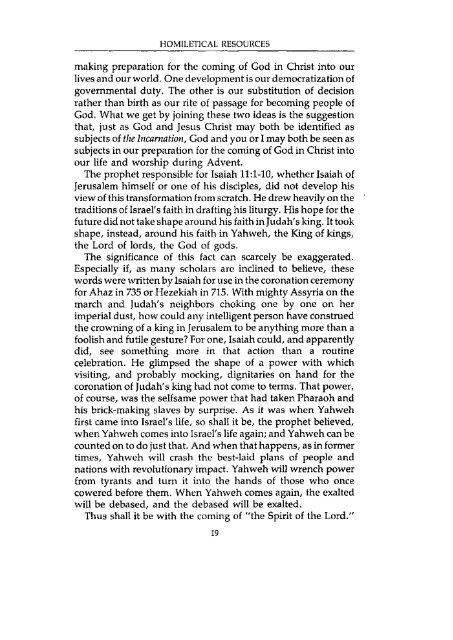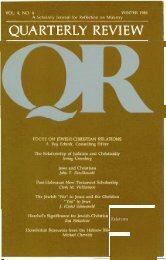Fall 1980 - Quarterly Review
Fall 1980 - Quarterly Review
Fall 1980 - Quarterly Review
You also want an ePaper? Increase the reach of your titles
YUMPU automatically turns print PDFs into web optimized ePapers that Google loves.
HOMILETICAL RESOURCES<br />
making preparation for the coming of God in Christ into our<br />
lives and our world. One development is our democratization of<br />
governmental duty. The other is our substitution of decision<br />
rather than birth as our rite of passage for becoming people of<br />
God. What we get by joining these two ideas is the suggestion<br />
that, just as God and Jesus Christ may both be identified as<br />
subjects of the Incarnation, God and you or I may both be seen as<br />
subjects in our preparation for the coming of God in Christ into<br />
our life and worship during Advent.<br />
The prophet responsible for Isaiah 11:1-10, whether Isaiah of<br />
Jerusalem himself or one of his disciples, did not develop his<br />
view of this transformation from scratch. He drew heavily on the<br />
traditions of Israel's faith in drafting his liturgy. His hope for the<br />
future did not take shape around his faith in Judah's king. It took<br />
shape, instead, around his faith in Yahweh, the King of kings,<br />
the Lord of lords, the God of gods.<br />
The significance of this fact can scarcely be exaggerated.<br />
Especially if, as many scholars are inclined to believe, these<br />
words were written by Isaiah for use in the coronation ceremony<br />
for Ahaz in 735 or Hezekiah in 715. With mighty Assyria on the<br />
march and Judah's neighbors choking one by one on her<br />
imperial dust, how could any intelligent person have construed<br />
the crowning of a king in Jerusalem to be anything more than a<br />
foolish and futile gesture? For one, Isaiah could, and apparently<br />
did, see something more in that action than a routine<br />
celebration. He glimpsed the shape of a power with which<br />
visiting, and probably mocking, dignitaries on hand for the<br />
coronation of Judah's king had not come to terms. That power,<br />
of course, was the selfsame power that had taken Pharaoh and<br />
his brick-making slaves by surprise. As it was when Yahweh<br />
first came into Israel's life, so shall it be, the prophet believed,<br />
when Yahweh comes into Israel's life again; and Yahweh can be<br />
counted on to do just that. And when that happens, as in former<br />
times, Yahweh will crash the best-laid plans of people and<br />
nations with revolutionary impact. Yahweh will wrench power<br />
from tyrants and turn it into the hands of those who once<br />
cowered before them. When Yahweh comes again, the exalted<br />
will be debased, and the debased will be exalted.<br />
Thus shall it be with the coming of "the Spirit of the Lord."<br />
19












